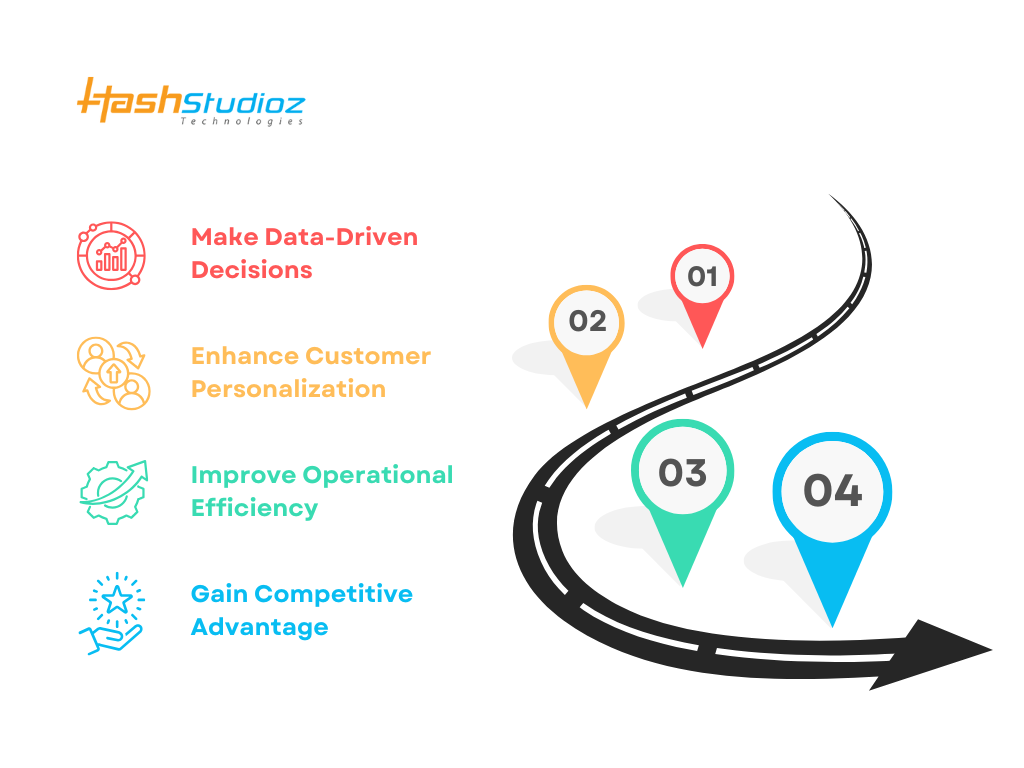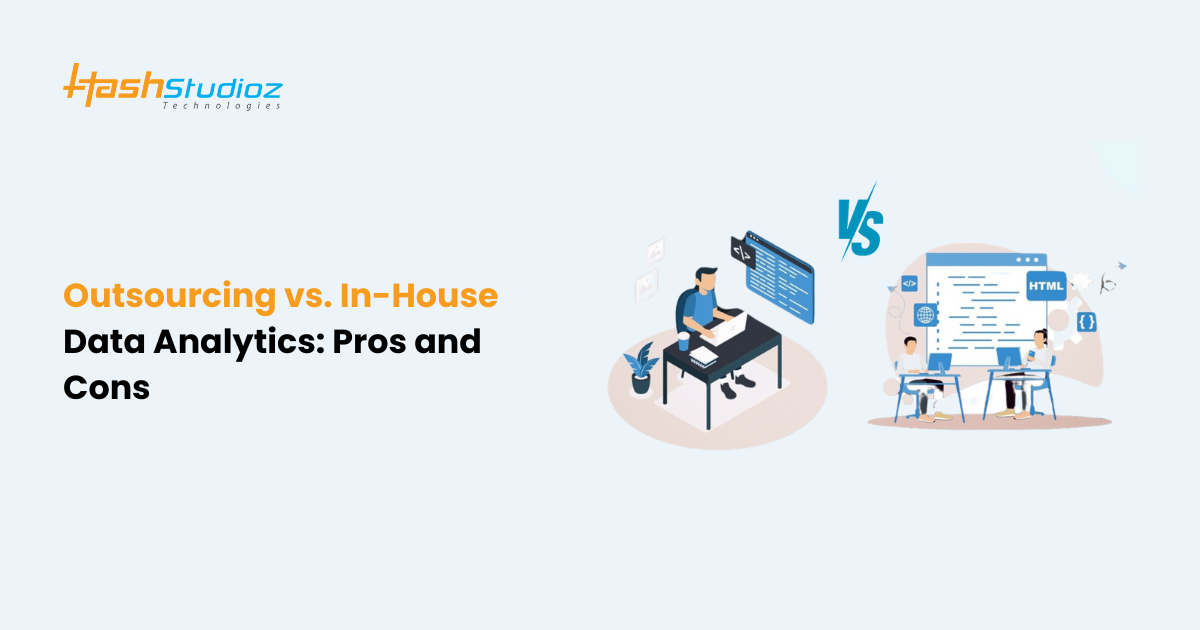The rapid growth of digital transformation has positioned data analytics at the heart of strategic decision-making for organizations worldwide. Companies now face a critical decision: Should they manage analytics in-house or outsource it to a specialized data analytics company? This article explores the pros and cons of each approach, providing a detailed analysis to help you determine the best fit for your organization.
- Businesses outsourcing analytics save 30-50% on operational costs compared to in-house setups.
- 63% of companies report difficulties in finding skilled data analytics professionals for in-house roles.
- By 2024, 70% of large enterprises are expected to outsource some form of analytics services to specialized companies.
Table of Contents
- The Role of Data Analytics in Modern Business
- Overview: Outsourcing and In-House Data Analytics
- Key Factors to Consider Before Choosing
- Pros and Cons of Outsourcing Data Analytics
- Pros and Cons of In-House Data Analytics
- How to Decide: Factors to Weigh
- The Future of Outsourcing vs. In-House Data Analytics
- Why Choose HashStudioz for Data Analytics Services?
- Conclusion
- FAQs
- 1. What is the primary advantage of outsourcing data analytics?
- 2. Is outsourcing data analytics secure?
- 3. What are the challenges of building an in-house data analytics team?
- 4. How can data analytics services benefit small businesses?
- 5. What factors should I consider when choosing a data analytics company?
The Role of Data Analytics in Modern Business
Data analytics plays a transformative role in shaping how organizations operate, strategize, and compete in today’s dynamic business environment. Here are some of the critical ways data analytics is redefining business success:

1. Make Data-Driven Decisions
Organizations leverage data analytics to analyze customer behavior, market trends, and operational inefficiencies. This empowers leaders to make informed decisions backed by solid evidence rather than relying on intuition.
2. Enhance Customer Personalization
Modern businesses use analytics to understand individual customer preferences, enabling them to offer tailored products and services. This level of personalization fosters stronger customer relationships and loyalty. For example, leveraging customer insights through data analytics services can lead to hyper-targeted marketing campaigns.
3. Improve Operational Efficiency
By identifying bottlenecks and inefficiencies, data analytics helps streamline processes and uncover cost-saving opportunities. Companies can optimize supply chains, reduce waste, and ensure smoother workflows.
4. Gain Competitive Advantage
Predictive analytics tools allow organizations to anticipate market shifts, customer demands, and competitor actions. Staying ahead of trends ensures that businesses remain competitive and seize opportunities faster than their rivals.
Overview: Outsourcing and In-House Data Analytics
Outsourcing Data Analytics
Outsourcing data analytics involves hiring external data analytics companies to manage your organization’s data-related processes and operations. These companies provide specialized expertise, state-of-the-art tools, and scalable resources tailored to meet your specific business needs. Outsourcing allows businesses to leverage the experience and technology of external providers without having to build these capabilities internally.
Key aspects of outsourcing data analytics include:
- Access to industry-leading data analytics services and solutions.
- Reduced upfront investment in infrastructure and personnel.
- The ability to focus on core business activities while leaving analytics to experts.
In-House Data Analytics
In-house data analytics refers to the process of establishing and managing a dedicated team within your organization to analyze and interpret data. This approach involves building the necessary infrastructure, hiring skilled professionals, and investing in analytics tools and technologies to handle data independently.
Key aspects of in-house data analytics include:
- Full control over analytics processes and strategies.
- Enhanced data security, as sensitive information remains within the organization.
- The ability to tailor analytics efforts to align directly with company-specific goals.
Both methods aim to unlock the potential of data analytics services, but their suitability depends on various factors, including budget, organizational goals, and data complexity.
Key Factors to Consider Before Choosing
1. Cost Implications
- Outsourcing: Offers cost savings by eliminating the need for infrastructure setup, hiring, and training. Pricing models are often flexible, allowing businesses to pay for services based on usage.
- In-House: Involves substantial initial investment, including salaries, tools, and infrastructure. Long-term costs may stabilize if the team is utilized efficiently.
2. Expertise and Talent
- Outsourcing: Access to a pool of seasoned data analysts, data scientists, and industry experts who specialize in diverse domains.
- In-House: Requires recruiting skilled professionals, which can be challenging due to the talent gap in the analytics industry.
3. Data Security and Privacy
- Outsourcing: Raises concerns about sharing sensitive data with third parties. Ensuring compliance with data privacy regulations is critical.
- In-House: Allows complete control over data, making it easier to adhere to internal security policies and regulatory requirements.
4. Scalability and Flexibility
- Outsourcing: Offers on-demand scalability. Businesses can scale analytics operations up or down based on requirements without long-term commitments.
- In-House: Scaling requires hiring additional staff and investing in new technologies, which can be time-consuming.
5. Speed and Efficiency
- Outsourcing: External companies often have the infrastructure and expertise to deliver results faster.
- In-House: Internal teams may face bottlenecks, especially during initial setup phases or when tackling complex projects.
Pros and Cons of Outsourcing Data Analytics
Pros
- Access to Specialized Expertise: Outsourcing provides access to a team of experienced analysts, data scientists, and technology experts.
- Cost-Effectiveness: Reduces overhead costs associated with hiring and training in-house staff, as well as investing in expensive tools and software.
- Focus on Core Business Activities: Outsourcing allows businesses to concentrate on their core competencies while delegating analytics to specialists.
- Scalability and Flexibility: Service providers offer scalable solutions, adapting to your needs as they evolve.
- State-of-the-Art Technology: Leading analytics firms use cutting-edge tools and platforms, ensuring your business benefits from the latest innovations.
Cons
- Data Security Concerns: Sharing sensitive data with a third party can pose risks if proper safeguards are not in place.
- Lack of Control: Companies may have limited oversight of outsourced analytics processes.
- Cultural and Communication Barriers: Differences in time zones, language, or work culture may lead to misunderstandings.
- Dependence on External Providers: Over-reliance on external teams can hinder long-term independence.
Pros and Cons of In-House Data Analytics
Pros
- Complete Control: Full control over analytics processes and data ensures alignment with organizational goals.
- Enhanced Data Security: Sensitive information remains within the organization, reducing the risk of breaches.
- Tailored Solutions: In-house teams can develop customized approaches specific to the company’s unique needs.
- Immediate Availability: In-house teams are more accessible for real-time collaboration and adjustments.
Cons
- High Initial Costs: Recruiting talent, acquiring tools, and training staff require substantial investment.
- Resource Constraints: Smaller organizations may struggle to attract and retain skilled professionals.
- Limited Scalability: Expanding in-house capabilities can be time-consuming and costly.
- Technology Upgrades: Keeping up with rapidly evolving analytics technologies can strain internal resources.
How to Decide: Factors to Weigh
Choosing between outsourcing and in-house analytics requires careful evaluation of several key factors to ensure alignment with your organization’s needs and goals. Here are the critical considerations:
1. Budget
Assess the financial implications of both models. Outsourcing may be cost-effective for businesses with limited budgets, while in-house analytics requires significant upfront investment in tools, talent, and infrastructure.
2. Business Goals
Ensure the chosen analytics approach supports your strategic objectives. For instance, if your business requires flexibility and rapid scaling, outsourcing might be more suitable. Conversely, in-house analytics may be better for companies needing complete control over their processes.
3. Complexity of Data
The complexity and volume of your data can influence the decision. Highly complex or specialized datasets may require the expertise of external data analytics companies, while less intricate needs might be effectively managed by an in-house team.
4. Long-Term Vision
Consider whether you require a permanent analytics capability or a temporary solution. Outsourcing is ideal for short-term projects or when testing new analytics strategies. In-house analytics is more suitable for organizations with a long-term commitment to building robust internal capabilities.
The Future of Outsourcing vs. In-House Data Analytics
As businesses increasingly rely on data to drive decisions, the choice between outsourcing and in-house analytics is expected to evolve based on emerging trends:
1. Outsourcing Data Analytics
Outsourcing will grow with AI and cloud-based platforms, offering cost-effective, cutting-edge solutions. Data analytics companies will enhance scalability and flexibility through global partnerships and managed services.
2. In-House Data Analytics
In-house analytics will thrive as tools become user-friendly and automation reduces the need for technical expertise. Businesses prioritizing security and customization will favor building internal teams.
3. Hybrid Models
Hybrid models will dominate, combining outsourcing for expertise and scalability with in-house teams for control and security, offering a balanced solution.
Why Choose HashStudioz for Data Analytics Services?
HashStudioz provides expert-driven data analytics services tailored to meet unique business needs. With advanced tools and proven methodologies, they empower businesses to make smarter, data-driven decisions.
How HashStudioz Can Help You
HashStudioz offers solutions like predictive analytics, business intelligence, and real-time insights. Their scalable services help optimize operations, enhance personalization, and drive competitive advantage.
Conclusion
The decision to choose between outsourcing and in-house analytics depends on your organization’s unique needs, goals, and resources. While outsourcing offers flexibility and cost savings, in-house teams provide control and customization. Assess your requirements carefully to determine the best approach for leveraging data analytics services effectively.
FAQs
1. What is the primary advantage of outsourcing data analytics?
Outsourcing data analytics allows businesses to access specialized expertise and advanced tools without the need for a substantial upfront investment.
2. Is outsourcing data analytics secure?
While outsourcing can raise data security concerns, partnering with reputable data analytics companies that follow strict compliance measures minimizes risks.
3. What are the challenges of building an in-house data analytics team?
Challenges include high initial costs, difficulties in recruiting skilled professionals, and the need for continuous investment in training and tools.
4. How can data analytics services benefit small businesses?
Data analytics services help small businesses optimize operations, understand customer behavior, and identify growth opportunities without requiring extensive resources.
5. What factors should I consider when choosing a data analytics company?
Consider the company’s expertise, industry experience, security protocols, and flexibility to meet your specific needs.

